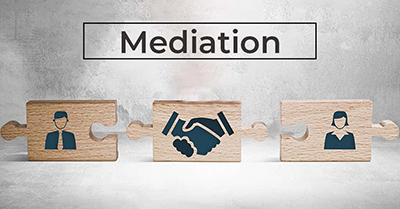Mediation is a structured, voluntary conflict resolution process that serves as an effective alternative to formal legal proceedings or arbitration. It is particularly suited for resolving disputes that are either outside the jurisdiction of courts or would benefit from a collaborative, out-of-court solution.
While mediation can replace traditional litigation, it also provides value in situations where legal remedies fall short or are undesirable. In Germany, the title mediator is not yet legally protected, though the role is typically fulfilled by trained professionals such as lawyers or psychologists.
Unlike court proceedings governed by statutory law, mediation is governed by two key contracts:
-
Mediation Agreement: Establishes the mutual rights and obligations of the disputing parties throughout the mediation process.
-
Mediator Contract: Defines the rights and responsibilities of the mediator in relation to the parties involved.
How Mediation Works
The mediation process is grounded in voluntary participation and emphasizes autonomous conflict resolution. A neutral, impartial mediator facilitates the process by offering technical negotiation support and assisting with emotional conflict dynamics. While mediation generally involves joint sessions, separate one-on-one discussions between the mediator and each party are also possible.
Mediation incorporates elements from conflict resolution, negotiation techniques, and systems theory. A prominent methodological foundation is the Harvard Concept, an interest-based approach characterized by:
-
Separating the people from the problem
-
Focusing on interests rather than positions
-
Generating multiple options for mutual gain
-
Evaluating solutions based on objective criteria
The effectiveness of the Harvard Concept has been documented by experts such as Duve, Eidenmüller, and Hacke (2003), and it remains a cornerstone of constructive mediation practice.
Phases of the Mediation Process
-
Opening Phase – The mediator explains the mediation process and clarifies expectations.
-
Information Gathering – The mediator collects data from all parties to identify key issues and gain a deeper understanding of underlying interests.
-
Interest Exploration – Parties engage in dialogue to understand each other’s perspectives and concerns.
-
Option Development – With the mediator’s support, the parties develop and evaluate potential solutions.
-
Agreement Phase – Agreed-upon solutions are documented, finalizing the mediation.
Applications of Mediation
In business environments, mediation is often used to resolve internal organizational conflicts—between employees, departments, or between management and works councils. It also plays a critical role in external disputes, such as those involving customers, partner companies, or public institutions.
Beyond the corporate world, mediation is applied in family, school, and environmental settings, among others. One of its primary advantages is cost-efficiency: compared to litigation, mediation is significantly less expensive, faster, and less adversarial.
« Back to Glossary Index





![15 Employee Offboarding Templates That Save Hours of HR Time [Free Downloads] 15 Employee Offboarding Templates That Save Hours of HR Time [Free Downloads]](https://i1.wp.com/www.hrcloud.com/hubfs/Header.png?w=150&resize=150,100&ssl=1)
